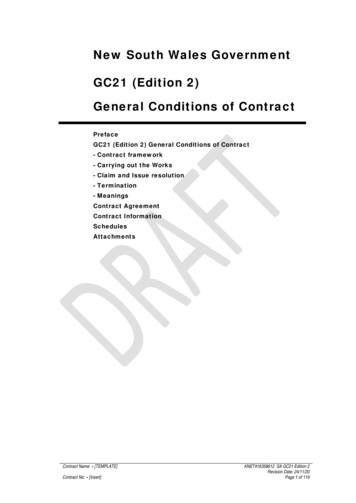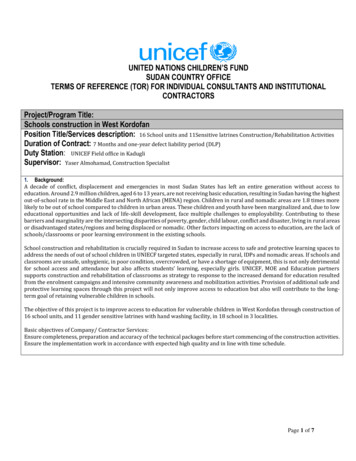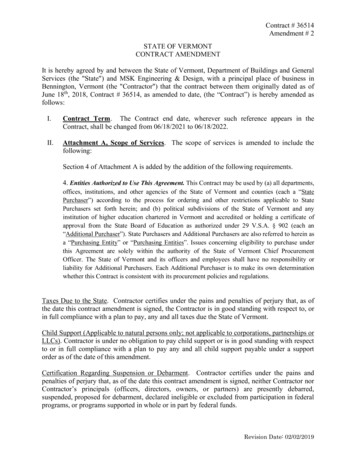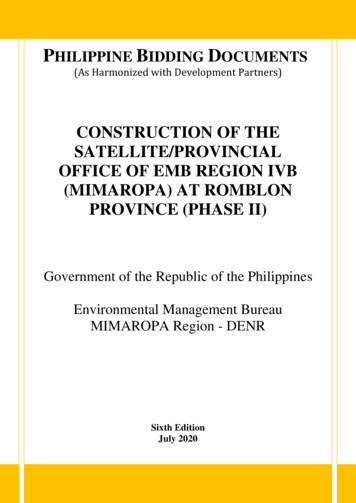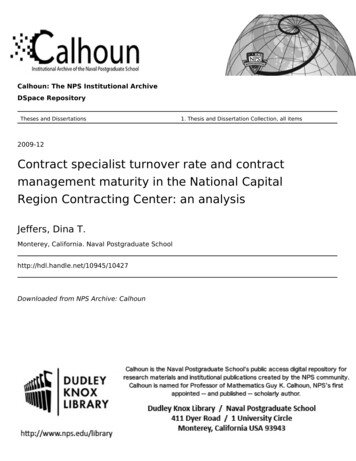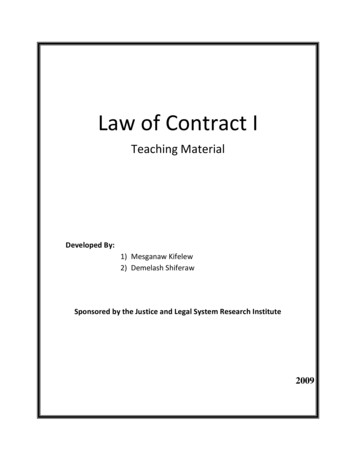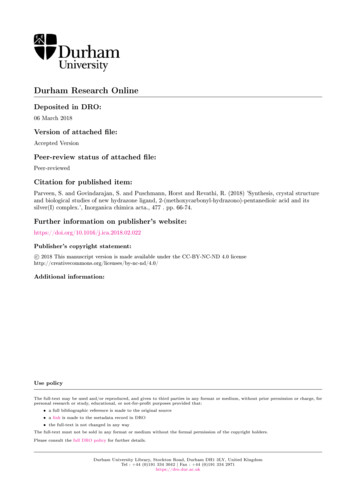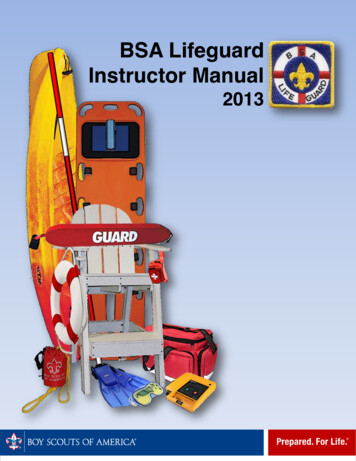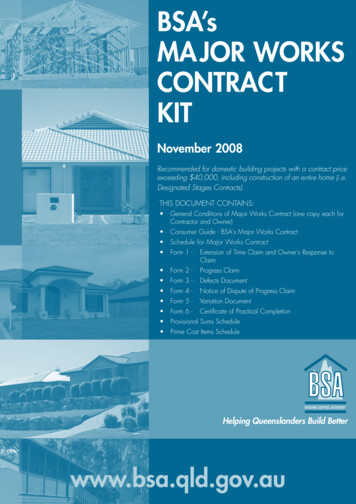
Transcription
BSA’sMAJOR WORKSCONTRACTKITNovember 2008Recommended for domestic building projects with a contract priceexceeding 40,000, including construction of an entire home (i.e.Designated Stages Contracts).THIS DOCUMENT CONTAINS: General Conditions of Major Works Contract (one copy each forContractor and Owner) Consumer Guide - BSA's Major Works Contract Schedule for Major Works Contract Form 1 -Extension of Time Claim and Owner's Response toClaim Form 2 -Progress Claim Form 3 -Defects Document Form 4 -Notice of Dispute of Progress Claim Form 5 -Variation Document Form 6 -Certificate of Practical Completion Provisional Sums Schedule Prime Cost Items ScheduleHelping Queenslanders Build Betterwww.bsa.qld.gov.au
I M P O R TA N TThe Domestic Building Contracts Act 2000 requires thecontractor to give copies of all contract documentation,completed and signed, to the building owner as soon aspracticable (but within 5 business days) after the contract isentered into.After the Contract Information Statement (in this case calledthe Consumer Guide) has been signed by the building owner,the contractor must give the original to the building ownerand retain a full copy for their records.
CONSUMERGUIDEBSA’sMAJOR WORKSCONTRACTNovember 2008This Contract Information Statement contains information of ageneral nature and is to be read in conjunction with BSA’s MajorWorks Contract Kit or other contracts for major domestic buildingwork. Nothing in this booklet should be interpreted or reliedupon as providing specific legal advice. For advice on particularcircumstances, especially contractual matters, you should consulta practising solicitor.Helping Queenslanders Build Better
CONTENTSPart 1 - Before you startPurpose of this guide3Who is BSA?3How can BSA help you?3BSA licence4Contract checklist4Liquidated damages6Before signing6The cooling-off period7Building approvals and inspections8Approved plans9Cost Plus ContractsInsurance during construction9Queensland Home Warranty Scheme9If you and your contractor are entering a “costplus” contract or a display home contract, contactyour nearest BSA office to obtain the cost plusor display home supplements to this ConsumerGuide. Cost plus contracts are easily identifiedbecause they do not state a total price for the workto be done. Instead, the amount you have to payis the actual cost incurred by the contractor plus apercentage of that cost, or the costs incurred plusan hourly rate.Part 2 - During ConstructionPayments - when and how much?10Changing the contract11Caveats12Access to the site12Dispute prevention12Mandatory building inspections13Quality control13Home property insurance14On completion/handover14Defects document14Part 3 - What to do if problems developDispute resolution15Part 4 - After moving inWarranties16Home maintenance17Termite management18Part 5 - Further informationFurther information22IMPORTANTWARNING: Cost plus contracts have added risks forhomeowners and contractors and their use is NOTpermitted under the Domestic Building ContractsAct 2000 unless certain conditions are met.Because of the uncertainty about the total contractprice, and the high risk of cost blowouts associatedwith their use, BSA strongly recommendshomeowners obtain formal legal advice beforesigning these types of contracts.
PART 1 - BEFORE YOU STARTPURPOSE OF THIS GUIDELegislation requires the contractor to provide you withcertain written information (the Domestic BuildingContracts Act 2000 - “the DBC Act” - calls this a“Contract Information Statement”) to accompanyall contracts for domestic building work where thecontract price exceeds 3,300.The BSA Consumer Guide covers all the informationcontractors are required to provide in an InformationStatement. In fact, you may be reading this booklethaving received it from your contractor on entering thecontract. The contractor must give you a copy of eitherthis booklet or an alternative Information Statementapproved by BSA before you sign a contract orwithin 5 business days after entering the contract.This booklet contains important information, includinga checklist of items you should go through beforeyou sign any contract for construction of a home orfor alterations, extensions or renovations where thecontract price exceeds 3,300.WHO IS BSA?The Queensland Building Services Authority (“BSA”) isa statutory authority established under the QueenslandBuilding Services Authority Act 1991.HOW CAN BSA HELP YOU?INFORMATIONBSA provides information and advice to consumersand contractors throughout Queensland. Thisassistance is provided through: Customer Service Centres in all BSA Offices; Media releases and articles; Information booklets for consumers andcontractors;BSA produces a useful booklet for homeowners calledFacts for Home Builders and Renovators. This bookletcontains information you should know before buildingor renovating in Queensland. Topics covered include: Project homes; Display homes; Individually designed homes; Reducing the risk of things going wrong; Dealing with your BSA licensed contractor; About your building contract; BSA insurance; Termite management and treatment; Recommended deposits and progress payments; Dispute prevention and resolution; Domestic Building Contracts Act 2000; and Information for Owner Builders.This information is also available from BSA’s websiteat www.bsa.qld.gov.au.Customer Service Officers at all BSA Offices are ableto provide information ranging from licence checksand details about licence holders, to information aboutBSA’s Queensland Home Warranty Scheme, disputehandling procedures, and requirements for buildingcontracts. Telephone 1300 272 272 statewide if youneed information or advice on any of these matters.LICENSINGBSA is also responsible for licensing all builders,building designers and most trade contractors inQueensland. A licence is required where buildingwork is valued at more than 1100 (or any valuein the case of building design, site classification,plumbing and draining, gas fitting, pest control or fireprotection).Ask to see the contractor’s BSA licence card. A range of Fact Sheets; The Building Links magazine for contractors; Seminars in Brisbane and regional centres; Participation in trade and industry shows; and BSA’s website - www.bsa.qld.gov.auBSA Major Works Contract - Consumer GuidePage 3
INSURANCEBSA operates the Queensland Home WarrantyScheme which offers you protection when you use aBSA-licensed contractor for construction of a home,or for any insurable work carried out at your homefor a value exceeding 3,300. The insurance policyprovides protection against non-completion of thework covered by the contract, defective construction,and subsidence or settlement of the footings.LICENCE NUMBERIdentifies the licensee andallows you to check theirhistory by visiting BSA’sweb site or calling BSA.LICENSEE’S NAMEEnsure the person you aredealing with is the personwhose name appears here.HELP WITH DISPUTESBSA also has a Resolution Services Division whichprovides information and assistance in dealingwith disputes between consumers and contractorsregarding defective or incomplete building work. Ifyou have a problem or concern about some aspect ofwork that has been done for you, the first thing youshould do is advise your contractor (both orally andin writing). If you are not happy with the outcome,telephone 1300 272 272 statewide for further advice.Note: Time limits apply for the lodgement of disputeswith BSA, so make sure you act promptly.CONTRACTSBSA publishes and sells three different contractswhich, together, cover the full range of domesticbuilding projects. These include the Major WorksContract (recommended for large domestic buildingprojects including the construction of an entirehome), the Minor Works Contract (recommended forrenovations, extensions and additions with a contractprice less than 40,000), and the Contract for SmallBuilding Projects (recommended for small renovation,maintenance and repair jobs with a contract price upto 3,300). These contracts may be purchased in hardcopy from your nearest BSA Office or downloaded forfree from the BSA website.BSA LICENCEUnder legislation, all builders, building designers andmost trade contractors must be licensed by BSA tocarry out building work (there are a few exceptionse.g. electricians who have their own licensing system).You should deal only with someone who has a BSAlicence card. Ask to see the contractor’s licence card(note that some trades, such as electricians, arelicensed by a different authority but you should still askto see their licence card).EXPIRY DATEThe licence holder mustnot undertake work iftheir licence has expired.LICENCE CLASSIndicates the work the holder is allowed to undertake.If the type of work you want done is not listed here,DO NOT PROCEED. Check immediately with BSA orfind a licensee who has your type of work listed.You can confirm whether the licence is current andappropriate for your particular building work byvisiting BSA’s website and using the free Online LicenceSearch facility. This will provide a report containingdetails of the contractor’s past performance which youmay download. It includes the number and value ofBSA-insured projects completed since 1992 and someinformation about the contractor’s dispute history,including the number of “directions” - or orders torectify defective work - if any, issued by BSA againstthe contractor. You can request a “certified” copy ofthe report from BSA for a small fee. Alternatively youcan confirm the licence details by telephoning BSA on1300 272 272.CONTRACT CHECKLISTBSA produces Minor Works and Major Workscontracts which are fair to both parties. If you don’tuse one of these BSA contracts, check that yourcontract has similar terms and complies with therequirements set out in this section. The BSA contractdocuments are available for comparison on BSA’swebsite.NOTE: A more detailed Contract Checklist is alsoprovided on BSA’s website.Page 4BSA Major Works Contract - Consumer Guide
WHAT DOES THE DBC ACT COVER?If your building work has a contract price exceeding 3,300 (including labour and materials) and involves: the erection or construction of a detached dwelling(including a duplex), or associated work; the renovation, alteration, extension, improvementor repair of a home (including a duplex or homeunit), or associated work (including kitchen orbathroom refurbishment); removal or resiting of a detached dwellingintended to be used as a residence, or associatedwork; other associated work including landscaping,paving, and the erection or construction of anybuilding or fixture associated with a detacheddwelling or home such as a garage, carport,retaining structure, driveway, fence, workshop,swimming pool or spa; the provision of services or facilities (e.g. lighting,heating, ventilation, air conditioning, water supply,sewerage and drainage) relating to the erectionor construction of a detached dwelling or therenovation, alteration, extension, improvement orrepair of a home; or site work relating to any of the domestic buildingwork referred to above,then your project comprises “domestic building work”under the DBC Act and you must put your contract inwriting.The DBC Act requires that your contractor provide acopy of the written, signed contract to you as soon aspracticable (but within 5 business days) after enteringinto the contract and before commencing work.Throughout this Guide any reference to “domesticbuilding work” includes all of the above types ofbuilding activities where the contract price for thework is more than 3,300.BEFORE SIGNING THE CONTRACT, CHECK FOR EACHOF THE FOLLOWING: The contract contains a conspicuous noticeadvising you, the building owner, of your right towithdraw from the contract under the “cooling-off”provisions of the DBC Act. The contract should state whether or not you area ‘resident owner’ (i.e. intend to live in the housewithin 6 months of completion of the contractedworks). The contract is in English and legible.BSA Major Works Contract - Consumer Guide The names and addresses of you and yourcontractor are included. The contractor’s licence number is noted on thecontract before work starts. There is a detailed description of the contractedwork. The date the contract is made is stated. The date the subject work is to start, or how thedate is to be decided, is stated. If the starting date is not yet known, the contractmust state that the building contractor will ensurethat the work starts as soon as is reasonablypossible. The contract states the date the contracted work isto be finished or, if the start date is not yet known,the number of days required to finish the workonce it is started. The contract details the allowances made bythe contractor for any likely delays (e.g. for nonworking days, inclement weather, etc.). Location of building site and description oflocation, including lot and plan numbers,are included. All agreed terms have beenincorporated in the written contract. The total price and payment provisions (includingthe deposit and progress payments) are clearlystated and in accordance with the DBC Act(refer to the section in Part 2 of this Guide titledPayments - When and How Much?). If your contract is for less than 20,000 the deposityou pay cannot exceed 10% of the total contractprice. If your contract is for 20,000 or more, themaximum deposit you have to pay is 5%.NOTE: Any fixtures or fittings shown in plansand specifications for the work are taken to beincluded in the contract unless they are listed asbeing excluded and you have signed or initiallednext to the exclusion list.WARNING! If you instruct the contractor to dosomething and the contractor has advised againstit in writing, then you may lose your right to havea defect corrected.NOTE: If you appoint an architect to administerthe project and the architect stipulates materials,you may not be entitled to the warranties relatingto those materials. Similarly, if you choose tonominate materials yourself you may not beentitled to these warranties.Page 5
If the contract price is subject to change, theremust be a warning located near the contractprice referring you to any clause in the contractwhich may have the effect of changing the price(e.g. variation clauses and prime cost item orprovisional sum clauses). Prime cost items and provisional sums, if includedin the contract, are listed on separate schedules. Definitions of key terms are included. Appropriate plans and specifications are includedif required for the contracted work. These mustbe sufficiently detailed to enable you to obtainany necessary approvals or authorisations fromgovernment authorities. Any special requirementsyou may have (for example the number ofcoats of paint required) should be stated in thespecifications. The contract lists and describes any fixtures orfittings which are not included (e.g. because youare supplying them separately). If the work includes or may affect footings ora concrete slab, the contractor must obtainappropriate ‘foundations data’ before enteringthe contract. This includes soil test data, contoursurveys and other geotechnical information. Thecontractor must provide you with a copy of thisinformation. The cost for this is normally coveredby a Preliminary Agreement or included in yourdeposit payment (check with the contractor).individual circumstances. The owner must be ableto substantiate the figure and it must not be punitive(i.e. it must represent the owner’s genuine estimate,at the date of signing the contract, of actual costs/losses they believe they are likely to suffer, withoutadding any extra cost to ‘punish’ the contractor). Thecalculation would typically include a daily allowancefor any additional rent (if the project involves homeconstruction or major renovations which necessitatemoving out), storage of furniture/personal effects,finance costs, etc. which are directly attributable to thedelay in the completion date.BEFORE SIGNING Be wary of clauses allowing for price or costincreases. These are known as “cost escalationclauses”. Legislation makes some of these types ofclauses invalid. If your contract says that any disputes are to bereferred to arbitration, that clause is invalid. Formore information on disputes refer to the section inPart 3 of this Guide titled What To Do If ProblemsDevelop. You are entitled to a receive a reasonable estimateof the cost of any items not given a fixed price inthe contract. For example: it might be the case that you have notfinally selected the tiles that you want in thebathroom, but you know the general qualityand style of the tile you are after. The tilesshould then be included in the contract as aprime cost item. The contractor must make areasonable estimate of the cost of supplyingthe tiles. That estimate must be stated in thecontract. Prime cost items do not includelabour as this should already be included inthe contract price. sometimes, it may not be possible for thecontractor to provide a definite price for aparticular contracted service at the time thecontract is entered into. For example, it mightbe the case that the contractor is expecting(based on a geotechnical report) to encounterrock when he/she does the excavation workfor footings, but it is not possible in advanceto say how much rock will be struck. In thatcase, the contractor should price that work asa provisional sum, stating in the contract areasonable estimate for the cost of doing thatwork. The statutory warranties are set out (see the sectiontitled Warranties in Part 4 of this Guide for furtherdetails).NOTE: These statutory warranties expire in six anda half years from the date of completion.LIQUIDATED DAMAGESBSA strongly recommends that homeowners includeprovision for appropriate liquidated damages inthe contract. This term refers to an amount per daywritten into the contract that is to compensate theowner for any costs/losses they are likely to suffer ifthe work is not completed by the contractor within thetime allowed for in the contract. Normally liquidateddamages would only be relevant to home constructionand fairly major renovations and extensions,especially those affecting occupancy of the house.Although some contracts include set amounts forliquidated damages, or default amounts (e.g. 15per day) which apply if the owner does not insert anyfigure into the contract, the appropriate amount willdepend on the nature of the work and the owner’sPage 6BSA Major Works Contract - Consumer Guide
prime cost items and provisional sums must belisted in a separate schedule (see below). For eachitem on the schedule there must be an estimatedcost, an amount for the contractor’s margin (or anindication of the method to be used to calculatethe contractor’s margin, for example, the cost ofthe item plus 10%) and a total dollar amount. Thistotal amount is an estimate only. The contractormust prepare such an estimate carefully, takinginto account the information reasonably availableat the time of contracting. But when the price forthe item or work is finally determined, it may behigher or lower than the original estimate in thecontract.PRIME COST ITEMS AND PROVISIONAL SUMSEvidence before paymentIf the contractor receives any evidence of the amountexpended on prime cost items or provisional sums,such as invoices or receipts, the contractor mustgive you copies of these documents before seekingpayment for the items from you. Also, your contractshould state which progress payment is to beincreased by the addition of these items. You shouldonly pay for these items when the particular progresspayment falls due.OTHER DOCUMENTS THAT SHOULD BE INCLUDED INYOUR CONTRACT Prime Cost Item Schedule and/or Provisional SumSchedule (where relevant). Plans and specifications detailing what workis to be done (the construction work must becarried out in accordance with these plans andspecifications).THE COOLING-OFF PERIODWITHDRAWING FROM THE CONTRACTUnder section 72 of the DBC Act you have a right towithdraw from the contract during what is known asa cooling-off period. Time limits apply and a writtennotice has to be given if you exercise this right. Youshould be sure that you understand your rights beforeyou exercise them. If in doubt contact a practisinglawyer or BSA. Be aware too that there will be certaincosts in withdrawing. You may withdraw from thecontract within 5 business days of receiving from thecontractor a copy of both:REPAIR CONTRACTSIn the case of repair contracts only, you and yourcontractor may agree to sign a notice waiving yourcooling-off rights.If you agree to this you will not be entitled to thecooling-off period. BSA advises you not to do thisunless the work is urgent.OTHER RIGHTS TO TERMINATEIn addition to the right to withdraw during the coolingoff period, you may have the right to terminate thecontract later on. Refer to the section in Part 3 of thisGuide titled Other Options.IF YOU DON’T RECEIVE A COPY OF THE CONTRACTAND INFORMATION STATEMENTOnce the contract is made, you must allow thecontractor five (5) business days to provide you with asigned copy of the contract and BSA Consumer Guideor other approved information statement. If after five(5) business days you still have not received yourcopies, you may withdraw from the contract undersection 72 of the DBC Act.Note: If your contractor later provides you with thecopies of these items, you may still withdraw fromthe contract but you have only five (5) business daysfrom the date you receive both documents in which toexercise this right.IF NO COOLING-OFF PERIOD NOTICEIf your contract does not contain a notice advisingyou of your right to withdraw during the cooling-offperiod, then under section 74 of the DBC Act you areentitled to withdraw from the contract within seven(7) calendar days after you become aware that thecontract should have contained a cooling-off notice.HOW TO WITHDRAWYou don’t have to provide any reason for withdrawingbut you must notify the contractor by delivering awritten notice to the contractor or to the contractor’saddress as shown on the contract before the coolingoff period expires. The notice must state under whichsection of the DBC Act you are withdrawing (ie. section72 or 74 ). the signed contract; and the BSA Consumer Guide (or other BSA-approvedcontract information statement).BSA Major Works Contract - Consumer GuidePage 7
Example of notice of withdrawal:Withdrawal NoticeWHAT IS A “PRIVATE CERTIFIER” AND WHAT IS THEIRROLE?The withdrawal is effective from the date of thisnotice.A private certifier is a building certifier who isaccredited with BSA to operate in any localgovernment area in Queensland. Whilst the contractorhas statutory and contractural obligations regardingthe approval and inspection process, if a contractorfails in this capacity, home owners are ultimatelyresponsible for ensuring that approvals are grantedand inspections carried out. You should discussand agree on arrangements for certification withthe contractor and record your agreement in yourcontract.Signed by Owner/s .Name .Date / / .If you wish to engage a private certifier you shouldcheck their accreditation details with BSA, ask themabout their past experience, and contact past clients.To [insert the full name of the contractor as itappears on the contract],Please be advised that I am withdrawing from mycontract with you signed on [insert date] undersection [insert the appropriate section number,section 72 or 74] of the Domestic Building ContractsAct 2000.COST OF WITHDRAWINGIf you do exercise your right to withdraw duringthe cooling-off period, then the contractor is entitledto receive 100 plus any out-of-pocket expensesreasonably incurred by the contractor up to the dateof withdrawal. If, at the time of withdrawal, thecontractor has already received a deposit greater thanthis entitlement, the excess must be refunded to thehome owner.YOU MAY NOT WITHDRAW UNDER THE COOLINGOFF PROVISIONS IF .The Integrated Planning Act 1997 requires that theengagement must be in writing and must state thecertification fee.There are two different levels of accreditation forbuilding certifiers related to the size of projects theycan undertake. Within these levels building certifiersare able to perform the following work: assessing building applications; issuing building approvals; inspecting and certifying construction; you and your contractor had a previous contracton similar terms, for similar work, and relating tothe same site or home; or issuing notices (e.g. stop work or rectificationnotices) on building work they are directly involvedwith; and you have received, or you tell the contractor thatbefore entering the contract you have received,independent legal advice about the contract froma practising lawyer. issuing certificates to allow the lawful occupationof certain classes of buildings.BUILDING APPROVALS & INSPECTIONSWHO CAN DO BUILDING APPROVALS ANDINSPECTIONS?Approvals for building work must be obtainedfrom a building certifier, who can be either a localgovernment building certifier or a private certifier.Inspections for compliance with approved work whichare required at certain stages (see details later in thissection) must be carried out by a building certifier ora competent person authorised by them. All buildingcertifiers must be licensed by BSA. Check their licenceby calling BSA or using the Online Licence Searchfacility at www.bsa.qld.gov.au.Page 8Private certifiers are required to have at least 1million professional indemnity insurance. There are anumber of matters over which private certifiers haveno authority and which can only be decided by thelocal government.These matters include: assessing town planning matters; reviewing the capacity and location of publicutilities (e.g. sewer mains, water supply, etc); exercising discretion on the siting of buildings (e.g.reducing the setback requirements); and granting exemptions to the installation ofswimming pool fences.BSA Major Works Contract - Consumer Guide
It is unlawful for any building certifier to certify orapprove work with which they are personally involvedas a contractor or designer, or from which they areable to derive a profit.Obtaining the necessary approvals and inspections isultimately your responsibility.APPROVED PLANSPlans and specifications should be included in thecontract documents. Make sure that, along with acopy of the contract itself, you obtain a copy of theplans from the contractor when they are ready forsubmission to the building certifier. Check the plansfor accuracy ensuring any variations are included andadvise the contractor immediately of any errors oromissions.Obtain a copy of the final approved plans (this is veryimportant if you later wish to sell the house) and keepit in a safe place.INSURANCE DURING CONSTRUCTIONINSURANCE FOR CONSTRUCTION OF A NEW HOMEYour contract should require the contractor to produceevidence that they have arranged and paid forappropriate construction insurance (including forContract Works and Public Liability) for the duration ofthe construction.In addition to Public Liability protection, this insuranceshould cover your building site against such things asfire, storm and tempest, flood, theft, vandalism, etcwhile the contractor is in control of the site.INSURANCE FOR RENOVATIONS OR EXTENSIONS TOAN EXISTING HOMEBefore work commences on site, advise your existinginsurance company of the details of the work tobe done, including the total value of the work, theapproximate start and completion dates, etc. Yournormal home property insurance policy may beinoperative while renovations or extensions are inprogress. Discuss this with your insurance company. Ifthis is the case make sure your contractor insures therenovation and/or extension work and, if necessary,the pre-existing home for the full duration of thebuilding work.BSA Major Works Contract - Consumer GuideQLD HOME WARRANTY SCHEMEFor residential constructiion work valued at more than 3,300 (inclusive of GST), the Queensland HomeWarranty Scheme operated by BSA provides up to 400,000 cover for a period of six years and sixmonths from the date of the contract if a licensedcontractor performs the work. The Queensland HomeWarranty Scheme insures residential construction workwhich is primarily: the construction of a dwelling or unit (providedthe building is not over 3 stories in height) andresidential outbuildings (e.g. garage, pool changeroom, etc.); and certain replacements of, or extensions to, partor all of a residential building (including refittingbathrooms and kitchens).The policy insures consumers when:a. during the course of the contract: the licensed contractor becomes bankrupt orgoes into liquidation; or the licensed contractor fails to complete thecontracted works for reasons that are not theconsumers fault;b. after completion of the work: the licensed contractor fails to fix defects thathave been the subject of a BSA direction,or, for various reasons (e.g. bankruptcy orliquidation, death, etc.) the licensed contractorcan’t attend to rectification;c. the building suffers from the effects of subsidenceor settlement.The contractor is required to pay the premium directlyto BSA before the plans can be approved by thebuilding certifier. When you receive your Certificateof Insurance from BSA (normally within two weeks ofsigning the contract), check that the Notified ContractValue agrees with your contract price. If these amountsvary you should contact BSA to amend your cover.If you pay before the contract requires and in advanceof work progress, you may not be covered for thosepre-payments under the Queensland Home WarrantyScheme. Do not pay for a contract stage until thatstage of construction has been completed.Page 9
PART 2 - DURING CONSTRUC
renovations, extensions and additions with a contract price less than 40,000), and the Contract for Small Building Projects (recommended for small renovation, maintenance and repair jobs with a contract price up to 3,300). These contracts may be purchased in hard copy from your nearest BSA Office or downloaded for free from the BSA website.

